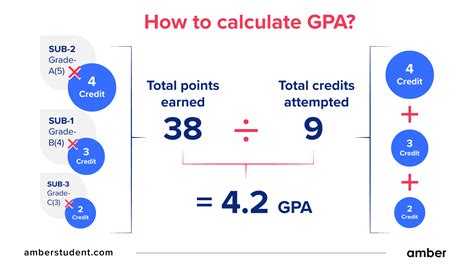Introduction

Your Grade Point Average (GPA) is a crucial metric that reflects your academic performance at the University of California, Santa Cruz (UCSC). Maintaining a high GPA is essential for scholarships, internships, and graduate school applications. To accurately calculate your UCSC GPA, it’s important to understand the university’s grading system and grading policies.
Understanding the UCSC Grading System
UCSC uses a 4.0 grading scale, with 4.0 representing an A and 0.0 representing an F. Grades are assigned based on the following scale:
| Letter Grade | Numerical Grade |
|---|---|
| A | 4.0 |
| A- | 3.7 |
| B+ | 3.3 |
| B | 3.0 |
| B- | 2.7 |
| C+ | 2.3 |
| C | 2.0 |
| C- | 1.7 |
| D+ | 1.3 |
| D | 1.0 |
| F | 0.0 |
Calculating Your UCSC GPA
Your UCSC GPA is calculated based on the following formula:
GPA = (Total Quality Points / Total Attempted Units)
Total Quality Points:
- Calculate the quality points for each course by multiplying the numerical grade by the course units.
- For example, if you earned an A (4.0) in a 5-unit course, your quality points for that course would be 4.0 x 5 = 20 quality points.
Total Attempted Units:
- Count the number of units you have attempted, regardless of whether you passed or failed the course.
- Courses that you are currently enrolled in are not counted towards your total attempted units.
Sample GPA Calculation:
Let’s say you have taken the following courses and received the following grades:
| Course | Units | Grade | Quality Points |
|---|---|---|---|
| MATH 10A | 5 | A (4.0) | 20 |
| CHEM 11B | 4 | B (3.0) | 12 |
| IST 12B | 3 | B- (2.7) | 8.1 |
| ENG 10 | 4 | A- (3.7) | 14.8 |
Total Attempted Units = 5 + 4 + 3 + 4 = 16
Total Quality Points = 20 + 12 + 8.1 + 14.8 = 54.9
Therefore, your UCSC GPA would be:
GPA = 54.9 / 16 = 3.43
Tips and Tricks
- Understand your syllabus: Read your syllabus carefully to understand the grading policies for each course.
- Attend class: Regular attendance helps you stay engaged with the material and earn better grades.
- Study effectively: Utilize study techniques that work best for you, such as spaced repetition, active recall, and flashcards.
- Seek help when needed: Don’t hesitate to ask your professors or TAs for clarification or assistance.
- Consider taking pass/no pass courses: This option can be beneficial if you’re struggling in a particular subject or need to lighten your course load.
Pros and Cons of UCSC’s Grading System
Pros:
- Clear and straightforward grading scale.
- No curve-grading, which promotes fair competition.
- Pass/no pass option provides flexibility.
Cons:
- Can be challenging to maintain a high GPA due to the absence of A+ grades.
- May not be compatible with other institutions’ grading systems.
FAQs
-
Can I calculate my GPA for a specific quarter or academic year?
Yes, you can calculate your GPA for any specific term by using the same formula and using the courses and grades you earned during that period. -
How often is my GPA updated?
Your GPA is updated after each grading period, typically at the end of each quarter. -
Is my GPA calculated on a cumulative basis?
Yes, your UCSC GPA is calculated on a cumulative basis, meaning it includes all the courses you have taken since starting at the university. -
What is a good GPA for UCSC?
The average GPA at UCSC is around 3.0. However, the competitiveness of your GPA will depend on your major, field of study, and career goals. -
Can I improve my GPA after graduating?
No, once you have graduated from UCSC, your GPA cannot be changed. However, you can take additional coursework at another institution to improve your overall GPA. -
How does UCSC’s GPA compare to other universities?
UCSC’s GPA is on par with other universities in the University of California system and other reputable institutions. However, it’s important to note that GPA standards may vary across institutions. -
What is the minimum GPA I need to maintain an academic scholarship?
The minimum GPA required for academic scholarships at UCSC varies depending on the specific scholarship. Typically, scholarships require a GPA of 3.0 or higher. -
How can I use my GPA to plan my future?
Your GPA can be a valuable tool for planning your future. It can help you identify your strengths and weaknesses, set goals, and make informed decisions about your career path.
